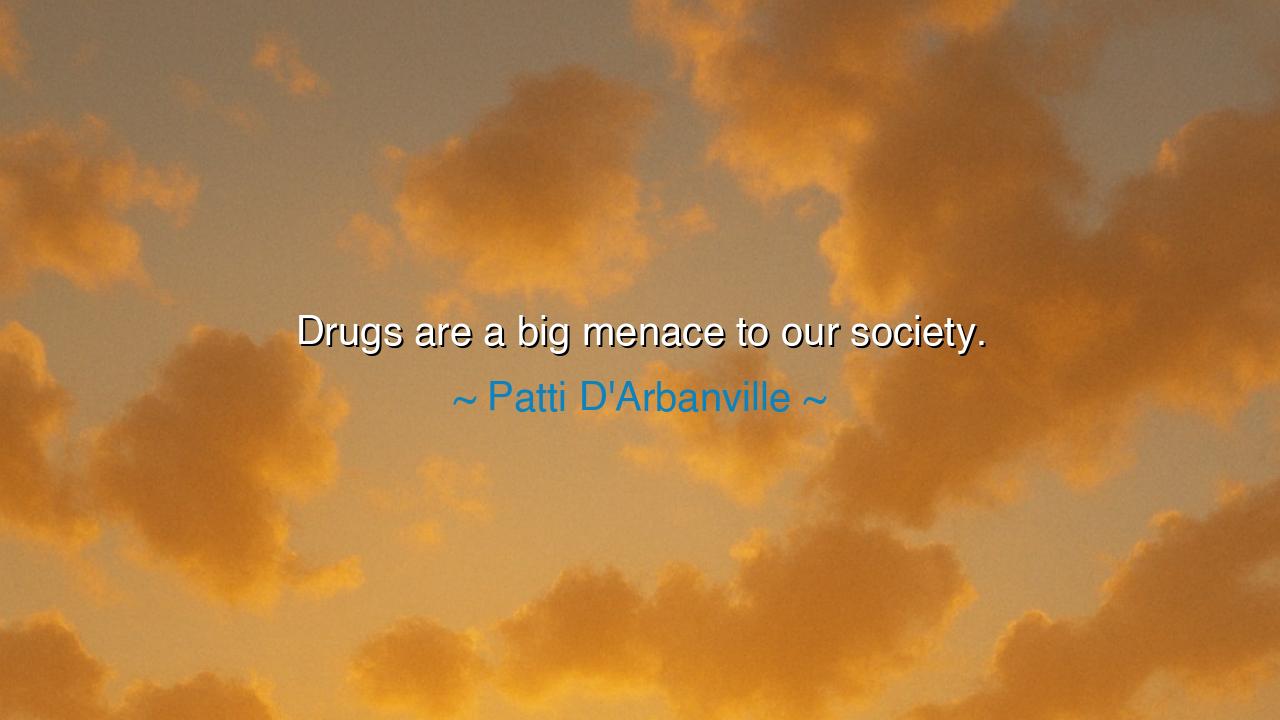
Drugs are a big menace to our society.






Hear the solemn words of Patti D’Arbanville, who warned: “Drugs are a big menace to our society.” This utterance is not light, nor is it casual. It is the cry of one who has seen how swiftly and silently the shadow of addiction spreads, eroding not only the body but the bonds of families, communities, and nations. A menace is not merely an inconvenience—it is a force of destruction, cunning and relentless, creeping beneath the surface until it devours what was once strong. By naming drugs thus, she called them out as enemies not only of health, but of the very fabric of society itself.
The origin of these words lies in the modern world’s struggle with addiction and the destructive industries that profit from it. D’Arbanville, an actress familiar with both the glitter of fame and the darkness that often stalks it, spoke from the awareness that drugs promise escape but deliver chains. In saying they are a “big menace,” she stripped away all illusions of glamour and laid bare the truth: this is no private indulgence but a collective danger. For when one person falls to addiction, it is not they alone who suffer—their family, their community, even their nation feels the wound.
The ancients, too, knew the peril of substances that enslave the will. Consider the tale of the Lotus-Eaters in Homer’s Odyssey. When Odysseus’s men tasted the lotus flower, they forgot their homes, their duties, their very selves. They wished only to remain in that stupor, caring nothing for the voyage or for their destiny. Odysseus had to drag them away by force, weeping and resistant. Just so does the drugged soul abandon purpose, lose sight of family, and drift away from life’s great journey. The menace is not only in the substance itself but in the way it strips a human being of meaning, of striving, of hope.
History offers another lesson in the Opium Wars of the 19th century. A mighty nation, China, was weakened and humiliated because addiction spread through its people like fire through dry grass. The craving for opium sapped strength, dulled minds, and left society vulnerable to exploitation and control. What had begun as indulgence became enslavement, and an empire was bent beneath its weight. Here, too, we see the truth of D’Arbanville’s warning: drugs do not merely harm the individual—they become a weapon against the stability of society itself.
The meaning of this quote, then, is that drugs are more than a personal vice—they are a communal peril. They shatter lives, break families, and weaken nations by corroding the virtues of discipline, clarity, and courage. To call them a menace is to remind us that they creep like an enemy army, silent yet devastating, striking not only those who consume them but all who love them. A society plagued by addiction cannot fulfill its destiny, for its people are bound in invisible chains.
What lesson shall we, who hear these words, carry into our lives? That vigilance is required—not only in our personal choices but in our compassion for those already ensnared. Let us educate the young before curiosity becomes captivity. Let us support treatment and mercy for those who fall, rather than only scorn and punishment. Let us speak openly of the dangers, for silence breeds ignorance, and ignorance breeds suffering. To defeat a menace, one must shine light upon it, expose it, and confront it with courage.
Therefore, children of the future, inscribe this teaching upon your hearts: guard your mind and body as sacred vessels, for what poisons them will poison the world around you. Do not seek false comfort in the shadow of drugs, for the solace they promise is but a mirage that leads to ruin. Instead, seek strength in truth, in fellowship, in the pursuit of purpose. For only through vigilance, compassion, and discipline can a society be freed from the menace that stalks it. And in that freedom, both individuals and nations may flourish, whole and unbroken, under the light of wisdom.






AAdministratorAdministrator
Welcome, honored guests. Please leave a comment, we will respond soon